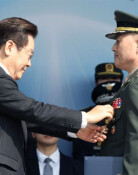Political Pressure May Invoke Constitutional Court Decision Before Elections
Political Pressure May Invoke Constitutional Court Decision Before Elections
Posted March. 14, 2004 22:41,
Following President Roh Moo-hyuns impeachment, the crucial task of deciding Rohs impeachment status is left to the Constitutional Court. An issue of no less gravity, however, is when the court will make that decision. Depending on when the courts decision is finalized, even the same results will affect political, social, and economic sectors differently.
In reverse, there are also those who say that the time period of the decision itself could affect the way that decision is made.
The most important factor related to time is the upcoming general elections.
If the court abides by its regular decision-making process and procedures, then it is difficult to expect a verdict on impeachment to be reached before the general elections.
The National Assembly must submit a bill, and President Roh, as the defendant, must submit a reply to the Constitutional Court. Investigations into the facts must be undergone and arguments from both parties must be heard. Gathering cases from abroad and analyzing them will also require much time and labor. Lawyer Hwang Do-su, former research official at the Constitutional Court, says, By regular standards, it is physically impossible to make a decision before the general elections, and it is probable that it will take at least three to six months.
A majority of the legal field, however, believes that this decision will be made differently from normal decision-making procedures because the case is one that has no precedent in Korean history, and is one that requires urgent attention, especially when taking the importance of political and economic stability into account. Justice President Yun Young-chul also said that speed and accuracy, two contradictory principles in reality, would be the courts priorities.
There are many in the legal field who believe that there is a large possibility of a decision being made prior to the general elections. If a decision is made after the general elections are held, the Constitutional Courts decision may be suspected of having political colors--an important reason for the court to make haste. Believers of this possibility display the political pressure that the Constitutional Court will undertake when making a decision after the general elections in the following scenarios.
First is the scenario where the governing party gains a majority in the general elections, and the Constitutional Court decides to dismiss the impeachment proposal. In this case, many will argue that the will of the people reflected in the general elections influenced the courts decision. The same can be said in the absolute reverse situation, where the governing party is crushed in the elections, and the court rules for impeachment. Some legal experts believe that it would be very difficult for the Constitutional Court to rule in favor of impeachment if the governing party is victorious in the general elections and proves that a vote of confidence has been made in Rohs favor.
On the other hand, if the Constitutional Court makes a decision before the general elections, the way of the decision itself is bound to affect the election results. In this scenario, not only has the court set a standard on what is a constitutional judgment, but it will also be accused of making a decision that leaned towards a particular party, affecting the elections. Such accusations will put a shadow over the courts rush in coming to a verdict.
As of now, it is hard to declare whether the Constitutional Court will choose accuracy or speed. Either side will give the court benefits and losses.
A former Constitutional Court research official said that it is difficult to predict which way the court will go. Since, however, the courts organization itself is a byproduct of political negotiations, and the justices put an emphasis on the courts responsible position, the official said that there is a possibility that a decision will be made unexpectedly soon.
Soo-Hyung Lee sooh@donga.com





![쓸개 파열로 “사흘 남았다” 판정받은 시인…18년뒤 “너를 아껴라” 속삭여[손효림의 베스트셀러 레시피]](https://dimg.donga.com/c/138/175/90/1/wps/NEWS/IMAGE/2026/01/08/133113134.1.jpg)

